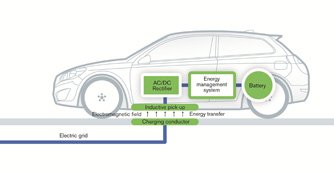New research brings inductive charging to EV's
27 Oct 2013|4,650 views

With inductive charging, the need for cords and cables are eliminated and energy is transferred via an electromagnetic field.
Inductive charging uses an electromagnetic field to transfer energy between two objects. An induction coil creates an alternating electromagnetic field from a charging base station while a second coil in the portable device picks up power from the electromagnetic field and converts it back into an electrical energy that charges the battery.
The completed research project, which included inductive charging for cars and buses, was initiated by Flanders' Drive, the knowledge centre of the automotive industry in Belgium. It featured a consortium of companies, including Volvo Car Group, Bombardier Transportation and coachbuilder Van Hool. The project was partly funded by the Flemish government.
A Volvo C30 Electric with a power output of 120bhp was supplied for the project and test revealed the car can be charged - wirelessly - In just 2.5 hours.
"Inductive charging has great potential. Cordless technology is a comfortable and effective way to conveniently transfer energy. The study also indicates that it is safe," said Lennart Stegland, Vice President, Electric Propulsion System at Volvo Car Group. He also added a common standard for inductive charging is not in place and further research and evaluation is needed for mass implementation.
According to Volvo - one of the partners of the project - the technology for cordless charging is possible and has a promising future.
With inductive charging, the need for cords and cables are eliminated and energy is transferred via an electromagnetic field.
Inductive charging uses an electromagnetic field to transfer energy between two objects. An induction coil creates an alternating electromagnetic field from a charging base station while a second coil in the portable device picks up power from the electromagnetic field and converts it back into an electrical energy that charges the battery.
The completed research project, which included inductive charging for cars and buses, was initiated by Flanders' Drive, the knowledge centre of the automotive industry in Belgium. It featured a consortium of companies, including Volvo Car Group, Bombardier Transportation and coachbuilder Van Hool. The project was partly funded by the Flemish government.
A Volvo C30 Electric with a power output of 120bhp was supplied for the project and test revealed the car can be charged - wirelessly - In just 2.5 hours.
"Inductive charging has great potential. Cordless technology is a comfortable and effective way to conveniently transfer energy. The study also indicates that it is safe," said Lennart Stegland, Vice President, Electric Propulsion System at Volvo Car Group. He also added a common standard for inductive charging is not in place and further research and evaluation is needed for mass implementation.
With inductive charging, the need for cords and cables are eliminated and energy is transferred via an electromagnetic field.
Inductive charging uses an electromagnetic field to transfer energy between two objects. An induction coil creates an alternating electromagnetic field from a charging base station while a second coil in the portable device picks up power from the electromagnetic field and converts it back into an electrical energy that charges the battery.
The completed research project, which included inductive charging for cars and buses, was initiated by Flanders' Drive, the knowledge centre of the automotive industry in Belgium. It featured a consortium of companies, including Volvo Car Group, Bombardier Transportation and coachbuilder Van Hool. The project was partly funded by the Flemish government.
A Volvo C30 Electric with a power output of 120bhp was supplied for the project and test revealed the car can be charged - wirelessly - In just 2.5 hours.
"Inductive charging has great potential. Cordless technology is a comfortable and effective way to conveniently transfer energy. The study also indicates that it is safe," said Lennart Stegland, Vice President, Electric Propulsion System at Volvo Car Group. He also added a common standard for inductive charging is not in place and further research and evaluation is needed for mass implementation.
Latest COE Prices
February 2026 | 2nd BIDDING
NEXT TENDER: 04 Mar 2026
CAT A$106,501
CAT B$105,001
CAT C$74,999
CAT E$112,890
View Full Results Thank You For Your Subscription.






















